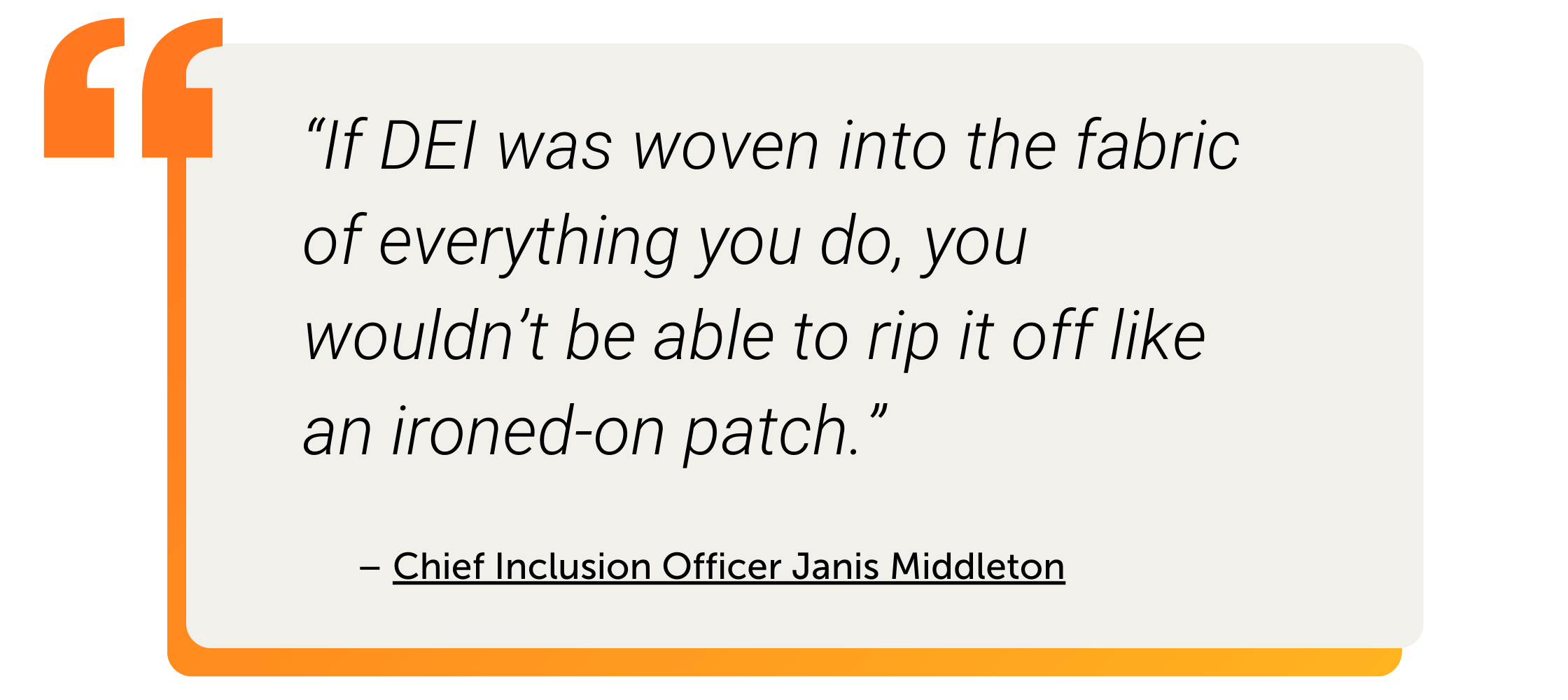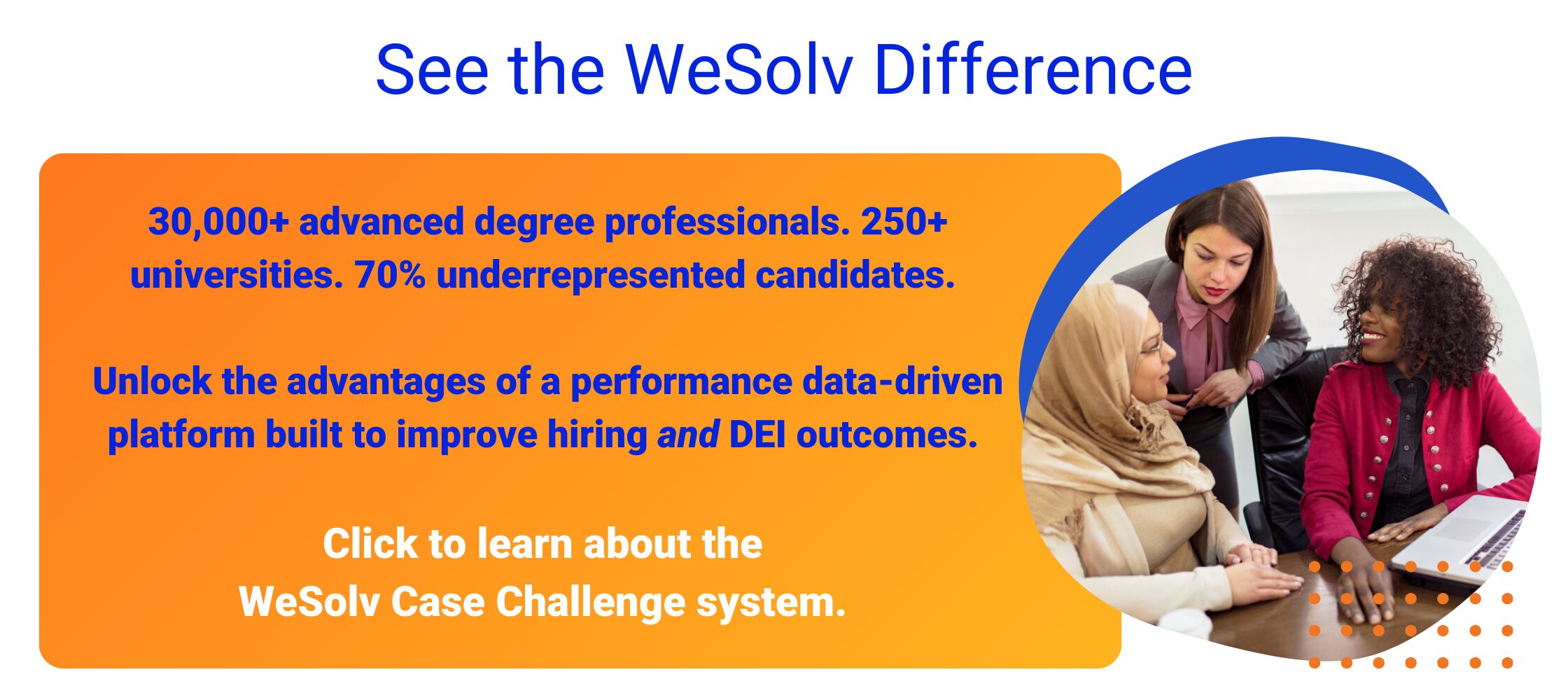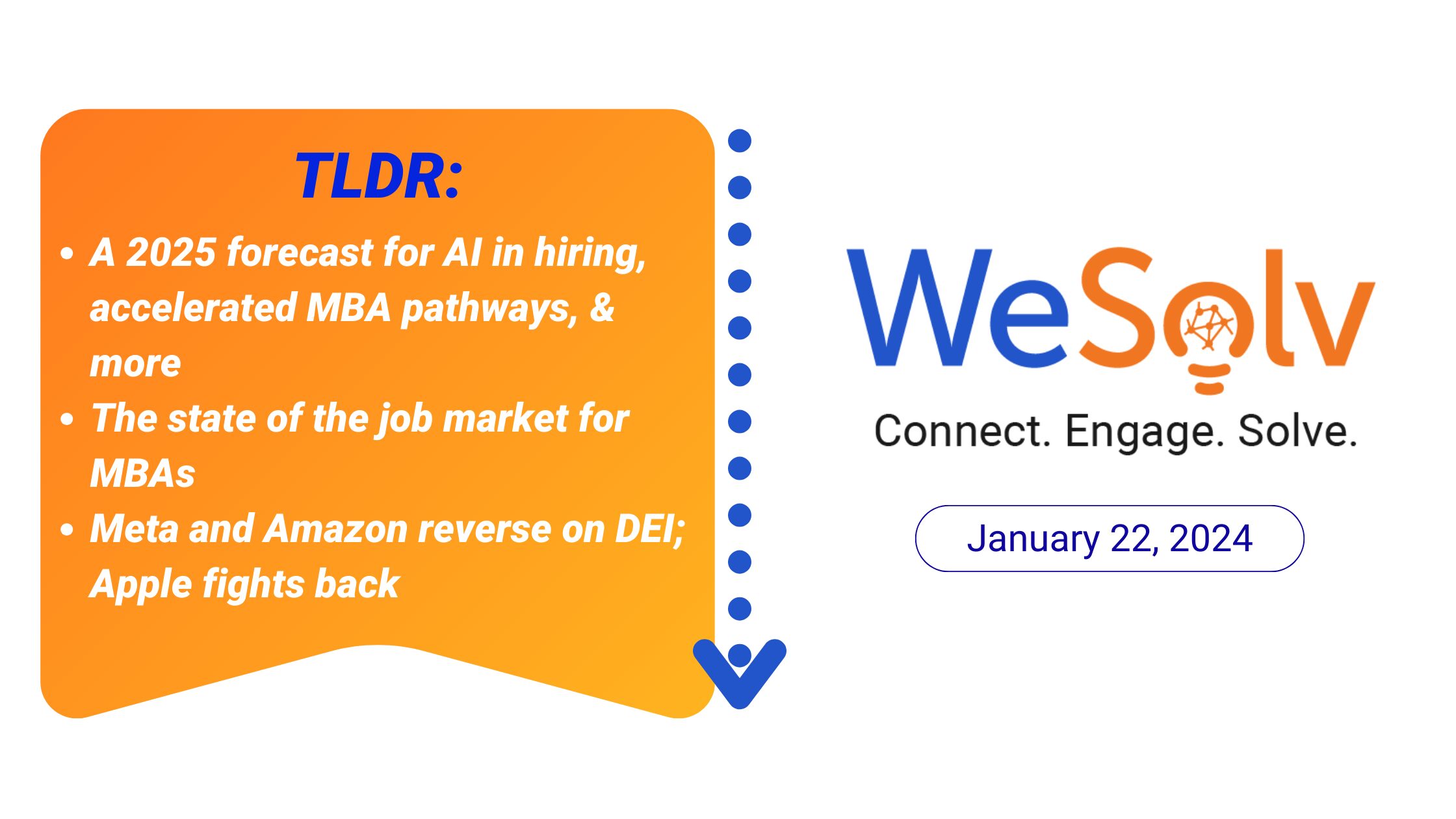Welcome to WeSolv’s monthly newsletter for our employer and university partners! Here, we’ll break down trending DEI x hiring news and equip you with the insights you need to support, attract, and hire talented underrepresented advanced degree candidates. Click here to receive these newsletters directly to your inbox each month.
I’ve had a lot to say about recent attacks on DEI and where we go from here. (If we’re not already connected on LinkedIn, I share more of my thoughts there. And for guidance on legally sound DEI initiatives, check out WeSolv’s updated report on navigating DEI risks.)
Today, I want to really zero in on a key solution: skills-based hiring. I believe it’s our clearest path forward for fixing broken hiring systems and moving ahead with DEI goals in a politicized environment.
Let’s zoom out. With AI and tech evolving fast, job skill requirements will shift 68% by 2030. Hiring managers already struggle to fill roles, while workers — especially those from underrepresented groups — are actively reskilling and upskilling to stay competitive. One major healthcare company reports 45% of its upskilling program enrollees are BIPOC, and 80% of Black and 71% of Latino workers without access to this training want it (vs. 62% of White workers).
Skills are clearly taking center stage. But without hiring methods that accurately assess skills, companies risk falling back on outdated, biased tactics that fail to evaluate candidate fit. With DEI under attack, skills-based hiring provides a crucial path to equitable, adaptable workplaces that benefit everyone, including underrepresented talent, by:
- Expanding access to diverse talent: McKinsey & Company says skills-based hiring opens doors for a broader range of candidates, and U.S. census data shows four-year degree requirements auto-eliminate 76% of Black and 83% of Latino workers.
- Promoting actual meritocracy: Contrary to anti-DEI talk, real meritocracy isn’t reverting to biased hiring practices — it’s ensuring candidates are assessed based on their actual abilities. Research from BCG shows that hiring for skills instead of degrees is 5x more predictive of job performance.
- Increasing diversity at senior levels: A study on in-demand skills found that Operations Analysts — a field with 30% more Black and Latino and 51% more women workers than Data Science — strongly overlap with Data Scientist skills. Turning that overlap into a pipeline funnel can increase wages, career mobility, and leadership diversity.
The gap between talent and opportunity is urgent, but solvable. To make skills-based hiring work, companies must ensure it not only removes barriers but drives mobility for all. This makes DEI efforts more impactful when they’re needed most.
Below, we’ll dive into skills-based hiring tactics that work alongside and complement your DEI goals, so that you can do this important work moving forward.
🥂To building workplaces that work for everyone,
Stella Ashaolu
CEO and Founder, WeSolv

1. Assess Biases in Your Current Hiring Process
As we’ve seen from this attack on DEI, policies that are implemented out of reaction – not intention – are the first to fall. Before rapidly shifting to a skills-based approach, make sure you’ve got a firm grip on where gaps at your org currently exist with tools like our free Equitable Hiring Assessment.
2. Make Project-Based Recruiting Transparent
Real project recruiting gives talent the chance to show their skills in action. But that only helps DEI (and your employer band) if candidates know how those skills are evaluated. Without transparently defined objectives, deliverables, and scoring rubrics, project-based recruiting can feel like just another unclear, time-intensive interview. (FYI, clear and transparent candidate criteria is a benefit of WeSolv’s Case Challenges.)
3. Expand Sourcing Beyond Traditional Pipelines
Skills-based hiring isn’t just about removing degree requirements — it’s about broadening access and evaluating skills, no matter one’s degree(s). Strengthen sourcing by partnering with universities, community colleges, skills-training programs, and apprenticeships where underrepresented talent seeks opportunities. Career Services departments can also play a key role in preparing students for skills-first hiring. We covered how in a recent blog.
4. Train Hiring Teams to Evaluate Skills, Not Resumes
A common skills-based hiring mistake is sourcing candidates based on skills but evaluating them using traditional markers like degrees or job titles. Train hiring teams not only to craft skills-focused job descriptions, but also on how to conduct structured interviews and use measurable assessments that hire for skills. For example, WeSolv grades candidates’ Case Challenges based on a weighted scorecard.
5. Build Skills-Based Internal Mobility Programs
DEI efforts shouldn’t stop at hiring — advancement matters, too. Create structured internal mobility programs where employees can qualify for promotions through skill-based projects instead of just tenure or degree requirements. This ensures diverse talent has a clear, equitable path to leadership.
For more insights on skills-based hiring tactics that strengthen DEI, head to the blog.
———————————————————-


———————————————————–

➡️ A rollback of LGBTQ+ protections. The EEOC stripped guidance on sexual orientation and gender identity discrimination from its website, and its chair spoke about “removing gender ideology” from workplaces. Law firm Foley & Lardner LLP says: “While removal of this guidance does not change Bostock’s definitive statement that Title VII covers sexual orientation and gender identity, its withdrawal surely indicates that enforcing Bostock’s mandate will no longer be a priority for the EEOC.” (More.)
➡️ Don’t use AI to apply. Signed, an AI company. That’s what Anthropic, the company behind AI chatbot Claude, is ironically telling job seekers. Its applications say: “While we encourage people to use AI systems during their role to help them work faster and more effectively, please do not use AI assistants during the application process. We want to understand your personal interest…without mediation through an AI system, and we also want to evaluate your non-AI-assisted communication skills.” (More.)
➡️ When “Harvard” doesn’t help. MBA grads have been facing a tough job market, which is true even for Ivy Leaguers. Harvard Business School has released data indicating that 23% of job-seeking Harvard MBA grads who graduated last spring were still looking for work three months later. (More.)
➡️ “Undermining important social progress.” That’s what 13 state attorneys general said about Walmart’s decision to back away from DEI in a letter sent to the United States’ largest private employer. They argued Walmart had incorrectly interpreted the Supreme Court’s affirmative action ruling and emphasized that DEI both remains legal and helps ensure compliance with civil rights laws. (More.)
➡️ (Mostly) a win for DEI. Pfizer said in a statement that Do No Harm, the conservative advocacy group who sued Pfizer over a BIPOC leadership program, had voluntarily dismissed its case. The conservative group had continued its lawsuit even though the pharma company did change the program in response, opening it to applicants of all races. Meanwhile, Do No Harm called the settlement a “victory,” which we’re seeing from such groups even when they lose in court. (More.)
———————————————————————————–

📕 Our 2025 Hiring Insights Survey is live and will inform new research on the underrepresented MBA experience. (Share it with candidates and students!)
📕 How to Future-Proof Your 2025 DEI Strategy — a topic that’s only becoming more relevant.
📕 Have the MBA candidates in your network seen our 2025 Complete List of MBA Case Competitions?

ghj

